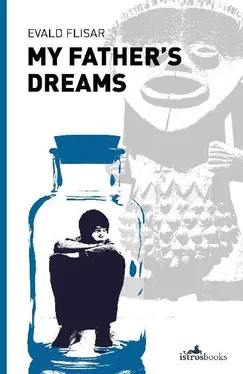The man turned up early and Mother and I had to suffer him for an hour. Mother spent most of the time in the kitchen, while he stealthily moved about the living room like a hungry grey spider.
“Unbelievable,” he kept winking at me and rubbing his hands together, dislodging dry skin flakes which descended slowly like petals to the floor. “Unbelievable, these dreams of yours. A historical oddity, I dare say.”
I felt increasingly stiff. It was evident that any conversation during or after dinner would revolve around me, and I found it unusual that Father hadn’t bothered to warn me of something so highly unpleasant. As soon as we finished soup, Dr. Kleindienst, as the man with dandruff was called, abandoned the small talk about weather, summer and good old times, and embarked on what was, no doubt in collusion with Father, the real aim of his visit.
“In all my years of psychoanalytic practice,” he said, “I have never come across a case where a patient — and I use the word advisedly — would be bombarded with the same dream night after night. Let alone a patient unable to tell dreams apart from reality.”
“But that’s been happening to Adam for quite some time,” Father said. “Hasn’t it?” he turned to Mother, who nodded without any detectable conviction.
“Hasn’t it, Adam?” Father turned to me, as if eager for us to present a common front to Dr. Kleindienst, like a closely-knit family.
I, too, nodded. Father and Mother obviously knew that I hadn’t stopped dreaming; it would be useless to pretend. What wasn’t clear was whether they knew the contents of my dreams. That seemed impossible. My dream diaries were safe with Abortus, he would never betray me. Unless, of course, it was Eve. But wouldn’t she be too embarrassed to talk to her doctor about what she heard me tell Grandpa Dominic?
While Mother fetched steaks, chips and salad, Father and Dr. Kleindienst embarked on an exchange of increasingly learned opinions. I don’t remember the exact words they used, but the following is my best shot at a reconstruction.
“I’ve never accepted Freud’s notion that dreams are a facade behind which their true meaning lies hidden,” stated the visitor, weighing a glass of wine in his hand as if to emphasize the thrust of his words.
“Neither have I”, Father said.
“The idea that the meaning of a dream is known to the unconscious, but may only enter the conscious mind camouflaged as a symbol, is manifestly wrong.”
“Yes,” Father nodded.
“Dreams are a part of nature, and nature has no intention to cheat, it merely expreses something as best it can, in the form of confused images.”
Dr. Kleindienst began to chew a piece of veal steak, holding knife and fork in his half raised hands as if trying to defend his point of view. But Father said nothing. Dr. Kleindienst swallowed the chewed piece of veal and washed it down with a whole glass of wine. Then he continued.
“I compare dreams to a screen on which the unconscious projects its inner drama. When we dream, the conflicts and misunderstandings among the forces of the unconscious appear on the screen in the shape of strange images.”
“Yes,” Father said, “but if my boy dreams that he has changed into a rooster, that doesn’t mean that he would like to become one. It means something else altogether. According to Freud it is one thing, according to Jung it is quite another. And if he keeps dreaming about sexually explicit scenes, the kind he may be daydreaming about when he is awake, this could mean a hundred different things. But none as important as the fact that he dreams about them night after night, and even in daytime, in fact every time he falls asleep.”
“Quite,” Dr. Kleindienst opened his mouth. I wasn’t sure, but it seemed that dandruff could be seen even on the piece of beef he was about to stuff into his mouth.
“Quite,” he repeated after swallowing it, “the language the unconscious invents to transmit its contents to the conscious mind can be startling, to say the least. Freud, for example, never explicitly analysed sexual dreams. But he claimed that most dreams were caused by repressed desires, most often sexual.”
He looked at me across the table and winked as if trying to tell me not to worry: my secret was safe with him. The he held out his glass and Father dutifully refilled it. They had finished a bottle, and Father went to the kitchen to open a new one.
For a few moments Dr. Kleindienst, Mother and I remained alone at the table. After a tense silence, Mother, while cutting her stake, scraped with her knife against the bottom of the plate, causing Dr. Kleindienst to wince and direct a censorious look at her.
“Can this be cured?” Mother said. “That’s all I want to know. Because this must, this simply must stop.”
“What’s interesting,” Dr. Kleindienst assumed a didactic tone, “is that treating everything from a to Z is not always the sensible option. Dreaming profusely doesn’t necessarily mean that there is something wrong with the boy. Maybe he is just bored. Maybe it’s a sign of incipient genius. It could also be — he is, after all, of that age — an aspect of sexual awakening, which is sometimes accompanied by full-blown hallucinations. On the other hand, it could also be, yes — “
“The beginning of schizophrenia?” Mother looked at him sharply.
“Madam,” Dr. Kleindienst glanced toward the kitchen, wondering how much longer Father would take, for obviously he had realised that, on his own, he would be no match for Mother, “to think of the worst possibility first is a sign, and please forgive me for saying so, of that exaggerated motherly concern which often itself causes the problems that are the reason for worrying. I don’t mean that Adam’s dreams could be a result of anything like that, certainly not, all I’m saying… this steak is excellent, Madam, quite exceptional… what I’m saying is that we know less about dreams than we like to imagine. Dreams are the last great mystery of the Universe. We can only guess at what they mean, and I’m afraid it’ll never be any different.”
“Then what is the point of your being here?” Mother decided to become rude. “We could easily have referred the boy to the nearest Gypsy fortune teller, they also interpret dreams. Why did we not think of that?”
Dr Kleindienst was visibly relieved when he saw Father returning. He almost fell of his chair as he held out his empty glass to have it refilled. He couldn’t even wait for my Father to fill it up; as soon as it was half full he pulled his hand back and drained it.
“For me,” he stressed, again addressing only Father, “the most important thing is that, according to Jung, the archetypal contents are almost invariably expressed in metaphors. When speaking of dreams we’re moving, and I speak from experience, in the world of poetry, a law unto itself, often shocking, yet closely linked to what we could call reality.”
“As for me,” Mother abruptly pushed her chair away as she got up, “I’m moving in the world of ledgers and balances and common sense, at least I try to. So I hope you’ll understand if I tell you that I’ve started to lose the thread of your learned debate. I’ll wash up instead. You carry on.”
She cleared the table and carried the dishes to the kitchen, but left the door open so that she wouldn’t miss any words. At the same time Father and Dr. Kleindienst raised their voices as if trying to make sure that she wouldn’t.
“Brain is a funny thing,” said Dr. Kleindienst. “Similar symptoms could be caused by a tumour. I’m afraid, Joseph, that you’ll have to examine the boy and exclude that possibility. But no doubt you have done so already.”
Mother appeared from the kitchen as if prompted. She didn’t come into the dining room; she remained in the doorway, nervously wiping a plate.
Читать дальше












